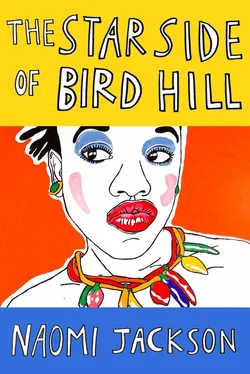This winter was the first that Dionne found herself somewhere other than Brooklyn but not the first time she’d welcomed the first snow without her mother. The girls’ last winter in New York, when the snow came, Avril was gone. The flakes started falling just before daybreak and Dionne, who’d never been able to sleep when her mother was out, was up when it began. She coaxed Phaedra awake to watch the snow fall slowly, then with more fervor as the sun pressed through the gauzy sky. They watched all morning as the snow made beds on the windowsills, and they tried their best to resurrect the ritual without their mother. Dionne made pancakes from mix that she poured out of the plastic bag that protected it from cockroaches that came out at night in Brooklyn like the field mice that rustled the sugarcane next to Hyacinth’s house after dark in Bird Hill. Phaedra sat at the kitchen table her mother had rescued from the Dumpster and painted a hopeful shade of yellow, her knees pulled up to her chest. She watched as Dionne burned the pancakes, and then pretended that she liked them crispy.
Night fell, but Avril still wasn’t home, and the marshmallows Dionne took down from the cabinet were starting to sweat the plastic bag on the counter where she had laid them. When the kitchen’s clock radio read ten, Dionne was sure that her mother wasn’t coming home. She felt overcome by a sudden thirst. The tropical temperature that the building was set to in winter dried out the lining of her throat. She perched on the lip of the open window in the living room and pulled back the security gate. Dionne called Phaedra and asked her to hold her hands as she leaned out of the window. She opened her mouth and let the snow tumble past her teeth, savoring the feeling of being suspended above the courtyard below. She leaned back more and more until Phaedra wouldn’t let her go any farther. Dionne sensed her sister’s fear in her tense grip, but she stayed supine, feeling the silver glow the moon cast above her and the cold wet falling onto her skin and into her mouth. When she finally came out of the window, she brushed past Phaedra and opened the marshmallows. She ate the entire bag in silence before going to bed.
Now Dionne was in Bird Hill on a Saturday morning in December when she was sure kids in Brooklyn were outside making snowballs and snowmen. Somebody else was kissing her old boyfriend Darren, some other girl wearing his varsity ring and letting him give it to her in one of Erasmus’s abandoned stairwells. Dionne tried to conjure what she’d felt for him when she’d first arrived, but there was no tingle between her belly and legs anymore. The part of her that needed a boy’s eyes to be seen was steadily dying, and she knew it would be a long time before she let herself be touched in that way again.
The sun beat down on the back of Dionne’s neck as she hung clothes to dry on the line behind the house. She felt the sweat collecting in her pits and between her thighs as a kind of betrayal of what she knew December should feel like. All summer and fall, she’d held out hope that something would change, but with the first snow falling without her and the blue sea and sun shining as brightly as they had been when she and Phaedra first arrived in June, the truth of this as her home now clicked into place. She finished pegging the clothes to the line and went back inside through the kitchen door.
Dionne was chopping okra for her grandmother’s cou-cou dish when the memory of leaning out of the window in the old apartment in Brooklyn came back to her. She remembered that when she finally came inside, Phaedra was crying. She pushed past her sister, thinking it was stupid for her to be afraid that she’d fall. In Dionne’s mind’s eye, her shoulders were brushing past Phaedra’s wet face. She could almost feel the cold at her back, the snow melting into her hair, her t-shirt plastered against her breasts, which were so much smaller then. Dionne was a stranger to apologies, but now she walked up to the edge of regret about how she’d treated Phaedra then.
It was no wonder that the knife in Dionne’s hand slipped.
Behind Dionne, Hyacinth was sitting on a stool, snapping the heads and legs off okra and watching her granddaughter. She noticed the patches where Dionne’s hair once was, the way she stood with her toes turned out, the same way Avril had. And so, just a split second after Dionne’s hand was cut, Hyacinth was out of her seat. By the time the blood started to soak into the cutting board, Hyacinth was by Dionne’s side, running her hand under cold water, fashioning an old white dishrag into a compress that brightened and then darkened as Dionne’s blood soaked it. Dionne was shocked into silence by the intensity of the pain; she drew in sharp breaths as her grandmother helped her.
When her blood stopped flowing, Dionne pulled back the rag and saw the white of the bone between her thumb and index finger. She knew the okra had been solid beneath her hand, their insides slick and white, just before she cut herself. She was reminded again of the snow she’d been dreaming of just before her accident, and of her mother.
Without warning, the tears that Dionne had been holding back since Avril’s death came, the ones she’d gritted her teeth against, thinking that if she ever started crying she would never stop. She let the tears form a salty river in her mouth and splatter her housedress. Hyacinth saw the dam she’d been watching for months finally break. And as she went to comfort Dionne, something dislodged from the high shelves of her own heart. Hyacinth’s mother had told her that grief was a funny thing, not put to bed before its time, and that not even a nine-night would still a soul that isn’t ready to come to rest. Hyacinth remembered her mother often over the weeks and months she’d waited for Dionne to shed the prickly shell she’d gathered around herself, to release Avril’s spirit from the tight, small place where she tried to keep it captive.
Hyacinth knew the way it was with a story. She held Dionne’s unharmed hand and led her into the front room. They sat down next to each other in the way that two people who know each other well only need to hear the sound of each other’s voice to know the look on their beloved’s face. Hyacinth waited until her voice steadied, and then she began.
“Well, child, the old people say that it was a morning just like this when wunna great-great-grandmother was doing laundry, beating the white clothes with a rock. Her shirt was still wet from the child the master had sold away a few days before. That time, her husband, your great-great-grandfather, was always behind her telling her to clean herself up. That was the thing that mashed them up in the end, you know, that he couldn’t understand she needed to see and smell the milk, that there was no sense in trying to erase the only thing she had left of the baby.
“She’d let others go before. But this one, for some reason, maybe because she knew it would be her last, this one was harder. After she had my great-grandmother, every Crop Over saw her tumbling big. One by one they all went away. There were more than a few she was happy to bury before they got to know this place. But then there were four that survived and came quick-quick, all boys that she raised until they were out of short pants, only to see them sold away. Everything Bertha knew should have told her not even to look on this new baby and think love or stay or lifetime, but that’s exactly what she did. And so when they took this one, and didn’t even let her nurse him, it was like something inside of her broke open. The least of her worries was the milk.
“The old people say that back in those days you would never see a body crying, because the body that starts crying, that body wouldn’t ever stop. But that’s not what I’m wanting to tell you, because you already know that things does start and then end even if you want them to go on forever.
Читать дальше












